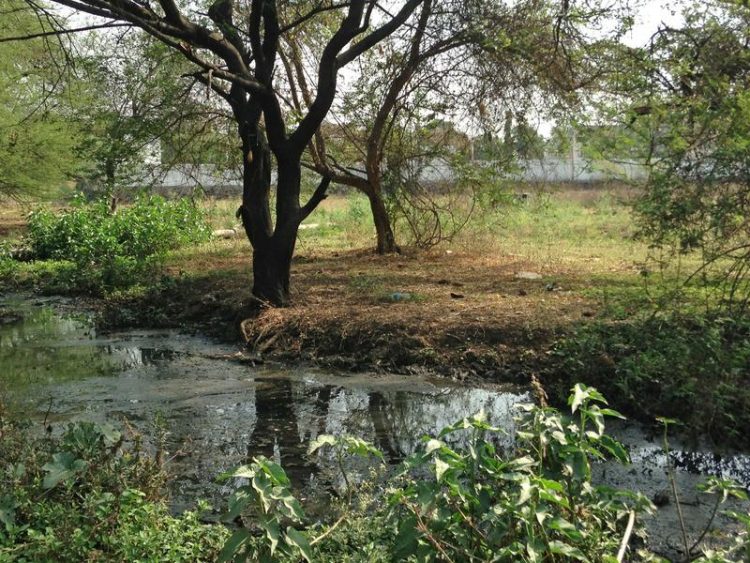Integrated Water Cycle in Indian Cities

Site where the pilot SRC installation is being planted. Currently raw sewage flows through the plot, a threat for the environment and local inhabitants. Picture: NaWaTech-Project
In order to cope with water shortages in urban areas, there is a need for a paradigm shift from conventional end-of-pipe water management to an integrated approach. Project NaWaTech, a EU-India cooperation coordinated by ttz Bremerhaven (Germany) and University NEERI (India), aims at maximizing the exploitation of natural and compact technical systems and processes for the effective management of municipal water resources, of water supply and sanitation services, and of the municipal water cycle as a whole in urbanized areas of India.
Natural water systems are flexible, cost-effective systems that require low operation and maintenance. They can absorb highly varying pollution loads, buffer seasonal fluctuations in the availability of water, and they can be integrated into the urban planning as green infrastructures, providing additional socio-economic benefits such as leisure spaces or by-products.
These systems have been tried and tested in Europe, but the location of India and many developing and newly industrialized countries in warmer climate zones sets different environmental conditions. NaWaTech will adapt and implement different technologies such as constructed wetlands, vertical gardens and short rotation plantations in six locations in Maharastra, India. The short rotation plantation pilot is now being installed at the Ordnance Factory premises in Nagpur, with a treatment capacity of 8m3.
Advantages of so-called Short Rotation Plantations (SRP)
One potential combined solution for the problems mentioned above, i.e. the need to increase the production of fuel- and pulpwood, the need to save water and the need for cheap and easy solutions for wastewater treatment is the use of wastewater for the irrigation of plantations of fast-growing trees, the so-called short rotation plantations (SRP). In this way large amounts of potable water for the irrigation of the plantations can be saved and used for other purposes.
Besides that, the wastewater is cheaply and easily treated as its contents, which usually include large amounts of nutrients, are filtered by the soil and taken up by the plants. Moreover nutrients and water provided by the wastewater irrigation enhance the growth of the trees and therefore lead to an increased production of wooden biomass to meet the increasing demands for fuel- and pulpwood. The production of marketable biomass for fuel or pulp and paper will incentivize the correct operation and maintenance of the wastewater treatment system. The wastewater treatment system can be completely self-financed and even provide an additional income.
The expected high wastewater treatment efficiency without significant negative effects on the environment implies that short rotation plantations can be a promising way of wastewater treatment in India. As a part of the NaWaTech project, a pilot-scale SRP for the treatment of domestic wastewater from a residential complex in Nagpur, Maharashtra is planned and will be established during the third week of September 2014.
As a first step a comprehensive study was conducted and the most suitable tree species were identified, Melia dubia and Bambusa bambos were selected due to their high biomass production and good adaptation to the local conditions. The identification of several suitable species adapted to different ecological conditions furthermore proves the transferability of the concept to other regions of India. The results of this study are expected to prove the feasibility of the concept of wastewater treatment in SRPs for India. More information about this study is available on NaWaTech Website http://nawatech.net/index.php/public-library/reports-deliverables/viewdownload/3….
An international team composed by 7 European partners, coordinated by ttz Bremerhaven, and 7 Indian partners, coordinated by NEERI, work on the adaptation of different systems to the Indian context during the 3 year lifetime of NaWaTech. The project “Natural water systems and treatment technologies to cope with water shortages in urbanized areas in India” is co-funded by the European Commission’s FP7 program under G.A 308336 and Department of Science and Technology, Government of India S.O DST/IMRCD/NaWaTech/ 2012/(G).
ttz Bremerhaven is an independent research institute and technology transfer center which performs application-based research and development. Under the umbrella of ttz Bremerhaven, an international team of experts is working in the fields of food, environment and health.
Scientific Contact:
Lucía Doyle (M. Eng.)
Team Leader International/Renewable Energies-biomass & biofuels
ttz Bremerhaven
Wasser-, Energie- und Landschaftsmanagement
Fischkai 1 – 27572 Bremerhaven – Germany
Phone: +49 47180934 155
Mobile: +49 15114841536
Fax: +49 471 809 34 599
Email: LDoyle@ttz-bremerhaven.de
Media Contact:
Christian Colmer
Head of Communications
ttz Bremerhaven
Fischkai 1
D-27572 Bremerhaven (Germany)
Tel.: +49 (0)471 80934 903
Fax: +49 (0)471 4832 129
ccolmer@ttz-bremerhaven.de
Web:
http://www.ttz-bremerhaven.de
http://www.nawatech.net/
http://www.facebook.com/ttzBremerhaven
http://www.twitter.com/ttzBremerhaven
http://www.xing.com/companies/ttzbremerhaven
Media Contact
All latest news from the category: Ecology, The Environment and Conservation
This complex theme deals primarily with interactions between organisms and the environmental factors that impact them, but to a greater extent between individual inanimate environmental factors.
innovations-report offers informative reports and articles on topics such as climate protection, landscape conservation, ecological systems, wildlife and nature parks and ecosystem efficiency and balance.
Newest articles

Nerve cells of blind mice retain their visual function
Nerve cells in the retina were analysed at TU Wien (Vienna) using microelectrodes. They show astonishingly stable behavior – good news for retina implants. The retina is often referred to…

State-wide center for quantum science
Karlsruhe Institute of Technology joins IQST as a new partner. The mission of IQST is to further our understanding of nature and develop innovative technologies based on quantum science by…

Newly designed nanomaterial
…shows promise as antimicrobial agent. Rice scientists develop nanocrystals that kill bacteria under visible light. Newly developed halide perovskite nanocrystals (HPNCs) show potential as antimicrobial agents that are stable, effective…



